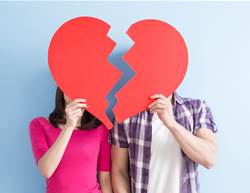If you’ve found your way to this article, you’re probably feeling extra horny lately. Or maybe you always have a high libido and are wondering why.
The first thing we’ll tell you is that people have such a vast range of sex drives that there is no real “normal.” All you can know is what’s normal for you. Some people have zero interest in sex, and that’s totally fine. Others want to have sex several times a week. That’s fine, too.
What’s more, no one’s sex drive is consistent throughout their entire life. You might be extra horny at certain times of the month or at certain points of your life (like right after starting a new relationship). At other times, your libido will dip. All of this is completely natural. “It’s normal for libido to ebb and flow,” Justin Lehmiller PhD, a sex and psychology expert, tells Prevention USA. “So I think it’s important for people to not get too worried if there are periods when they’re horny and periods when they’re less horny.”
That said, there are still some answers to “why?” Why are you so horny right now? Why are you almost always more horny than your partner or friends?
Factors that can affect libido
Dr Lehmiller likes to think of libido as “bio-psycho-social,” meaning it has biological elements, psychological elements, and social elements. While it’d be almost impossible to list every trigger for higher sex drives, the triggers will almost always come down to one or more of these three elements.
Biological
Biological reasons you might be more interested in sex mostly have to do with the level of sex hormones like oestrogen and testosterone that are in your body at any given time.
People assigned female at birth might notice a higher sex drive at certain points during their menstrual cycles. Sex education site The O-School explains that for a lot of people, their sex drive is highest when they’re ovulating (roughly 14 days after their period starts). Although no one has a solid understanding of why, the theories all surround hormones, which we of course know impact our libidos (that’s partly why menopause typically comes with a reduction in sex drive). Interestingly, if you’re on hormonal birth control, which releases a steady level of synthetic hormones all month, you might not experience periodically increased horniness like someone who’s not.
Some people also really enjoy having sex during their period, so they might see a sex drive boost at that time. Similarly, life events like pregnancy and nursing can cause a fluctuation in hormones, making you more or less horny than usual.
People assigned male at birth might also have higher or lower sex drives depending on hormone levels. Typically, testosterone is highest for men and people assigned male at birth in early adulthood. Testosterone can drop by one percent every year after 40, according to Harvard Health. As testosterone gets lower, so likely will your sex drive. Some medical conditions and injuries may also impact testosterone production and therefore libido.
Exercise is another reason you might be more horny than others, sexologist Shamyra Howard, tells Prevention USA. “Exercise releases feel-good hormones that increase energy levels,” she says. A 2018 study found that physically fit people experience higher levels of sexual desire, arousal, and orgasms.
Psychological
Psychology is arguably more powerful to your sex drive than biology. Consider someone saying they’re “not in the mood” for sex. Because sex is extremely intimate, your emotions and stress level often need to be in the right place for you to want sex. “Some people respond to things like stress, anxiety, and depression by having a steep drop off in sexual desire, whereas for other people, those same factors can actually accelerate sexual desire,” Dr Lehmiller says.
While extreme stress and depression are much more likely to shut down your sex drive than amp it up, some people respond to psychological struggle by wanting more sex. Dr Lehmiller says the ability for sex drive to go in both directions is one reason it’s important to understand yourself and the ways you respond to stress. It’s possible you use sex as a coping mechanism. There may also be times when you’re feeling “good stress,” also known as “eustress,” Howard says. Good stress might happen when you move to a new home, start a new job, or go on vacation. “Good stress creates excitement and can increase sexual desire,” she says.
Particularly happy times in your life might also lead to a higher sex drive. Sex is often a big way we connect with our partners (which gets into social factors, too). So imagine how horny you might be leading up to your wedding night, when you’re so excited and filled with love. Or how your partner doing something extra romantic can immediately put you in the mood.
Social
Finally, you might experience a heightened sex drive as a result of how things are going in your relationship at the moment. Most people who like sex have experienced the “honeymoon phase” of a new relationship, when you just can’t get enough of each other. It’s natural for you and your partner to have stretches of time when you’re both extra horny and stretches when you’re not as into sex.
“If things are really good, that can amp up your desire,” Dr Lehmiller says. “But if you’re having a lot of conflict and trouble in the relationship, that can push down desire.”
When thinking about why you’re feeling extra horny, you have to consider all three of these factors from a broad lens, he says. Sometimes one factor is more powerful than another, sometimes two or more factors cancel each other out, and sometimes they align to make you feel super sexy all the time.
Now, if you’re a person who has a baseline high libido, you’ll likely also experience highs and lows, but just generally be in the mood more often than others. Once again, it’s important to know that doesn’t mean anything is wrong with you. If you’re feeling bad about your high sex drive, those feelings likely come from someone having shamed you.
“I think where problems arise is when people get into relationships where they have very mismatched sex drives,” Dr Lehmiller says. “We see a lot of blaming and shaming where sometimes the higher desire partner thinks there’s something wrong with the lower desire partner because they don’t want sex, and the lower desire partner sometimes shames and blames the higher desire partner because they think they’re addicted to sex.”
How to navigate a libido gap
If you and your partner have a big sex drive gap, or are noticing a growing sex drive gap, Dr Lehmiller says the first step is to try to look for a compromise. Yet, most of us aren’t great at talking out our sexual desires (we were never taught how to!). Instead, we tend to keep our sexual desires and concerns bottled up. If you find yourself struggling to communicate through a desire gap, consider seeing a sex therapist. A therapist can help you break past the shame of struggling with sex and find ways for both of you to get more pleasure.
Dr Lehmiller often recommends scheduling sex so it happens at a frequency both partners are comfortable with and gives each person opportunity to build up anticipation and excitement. “Often, part of the reason somebody doesn’t have the desire for sex is that they need to essentially have more foreplay to get aroused,” he says. You may want to think of foreplay as something that happens over a span of a few days and amps up from flirting with your partner to more physical touch.
Masturbation, either solo or together, could also be a solution, as can opening-up your relationship. The most important thing to do is communicate. “Where we see things that don’t work out is when people pursue individual solutions and don’t talk about it at all,” Dr Lehmiller says. When you struggle to communicate at all or communicate well, Howard recommends turning to a sex therapist who can help you manage sexual issue and create sexual experiences that work for your relationship.
You can find sexual happiness in a relationship with a sex drive gap, but you have to talk it through and take action.
Can you be too horny?
Sex addiction is a complicated topic, with many experts disagreeing on whether or not it’s real. But generally, if your sex drive isn’t getting in the way of your life (causing distress or getting you in trouble at work, for example), you’re not a sex addict. You’re just someone who likes sex a lot, and there’s no shame in that.
The “why?” here is a bit complicated, too. There’s isn’t a lot of science that explains why some people have high libidos and some don’t. But Dr Emily Nagoski gives a great analogy in her book Come As You Are. She describes arousal as a system of gas and brake pedals. If something hits your gas, it turns you on and if something hits your brakes, it turns you off. Some people have very sensitive gas pedals, so they get aroused easily and want sex more often than others.
How sensitive our gas (arousal) pedals and our brake (turn-off) pedals are is highly variable. So much so that you’ll probably never find a couple who have perfectly aligned sex drives.
What to do to lower your libido
If you’re looking for ways to lower your libido, Dr Lehmiller says the first question to ask yourself is “why?”
“Is high libido itself really a problem, or is the issue unresolved shame or the social comparison they’re making?,” he says. Often, people have feelings of shame about sex. A partner or friend may have told you that you want “too much” sex, or you may think your libido is too high because you’re comparing yourself to someone with low libido.
Howard suggests that instead of focusing on your libido, figure out what about your libido bothers you and focus on that. “Often, people who have increased sexual desire seek to lower their libido because they experience symptoms of anxiety, other mental stressors, and/or they engage in unsafe sexual practices,” she says.
If your high libido is causing you distress or making everyday life more difficult, it’s time to seek out a sex therapist who can help you understand if there’s really a problem with your libido, what might be causing it, and how to work through it.
When to get help
Howard recommends anyone who feels distress about their libido or sex life find a sex therapist. But if you’re not sure that’s the right step for you, some signs that you should seek help include: spending money you don’t have on sexual activities like porn or sex workers, is sex is the main reason you have arguments and conflict in your relationship, and any other negative consequences (like getting fired from your job for a sex-related reason, or losing friends because of your attitude toward sex).
Howard encourages anyone having unwanted or negative consequences due to their libido, or who finds it hard to control sexual urges, to see a sex therapist to “create a plan for what a healthy sexuality looks like for them.”
Your libido and your relationship to your libido is unique, but if you have questions or concerns, a sex therapist is the best person to help.










